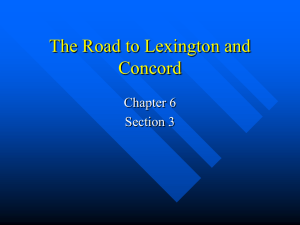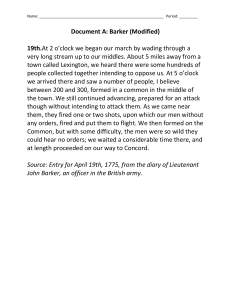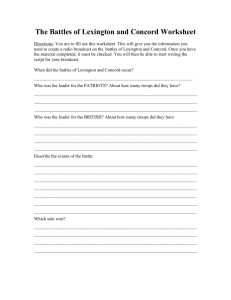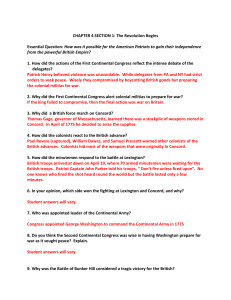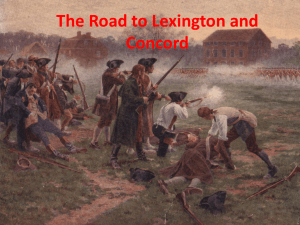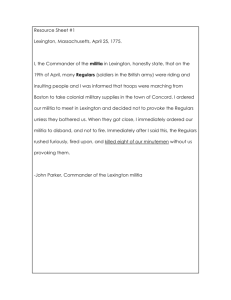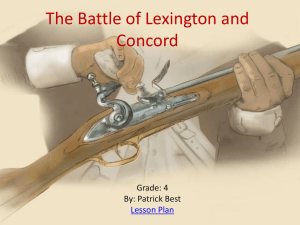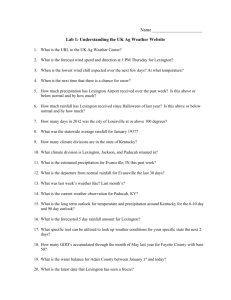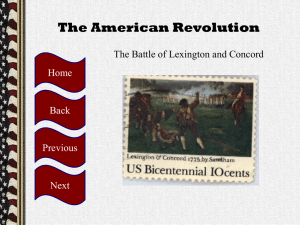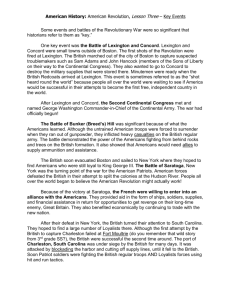The Battle of Lexington and Concord Becoming a Detective Who
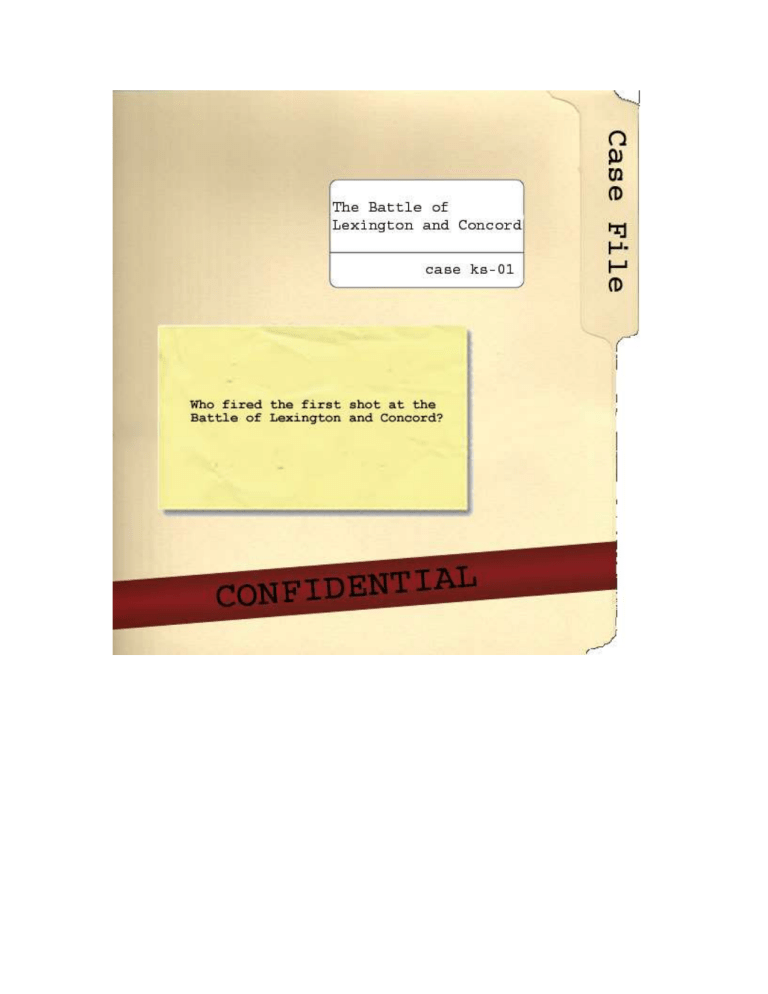
The Battle of Lexington and
Concord
Becoming a Detective
Who fired the first shot at the Battle of Lexington and Concord?
There are a series of documents that follow. It is your job to determine the type of evidence included within this file, the credibility of each piece of evidence and how the evidence fits together. Finally, you will be asked to come up with a plausible explanation of who fired the first shot at the Battle of Lexington and Concord and how you came to that particular conclusion.
Investigating the Evidence
Document A : Letter from Joseph Warren (President pro tem), April
26, 1775
Document B : Affidavit sworn by 34 minutemen on April 25, 1775
Document C : Excerpt from the novel April Morning by Howard Fast, published in 1961
Document D : Entry for April 19th 1775, from the diary of British
Lieutenant John Barker
Document E : Newspaper account from The London Gazette , June 10,
1775
Document F : From the diary of Ezra Stiles, pres. of Yale College,
August 21, 1775
Document G : From The United States: Story of a Free People , published 1963
Document H : British Ensign Jeremy Lister, personal narrative written in 1782.
Searching for Clues
Please answer the following questions about each document or download the formatted Case File ( Word Format | PDF format ).
1.
Who authored the document? When was the document authored? What type of document is this? Who was the audience for the document?
Why was it created? Who was the aggressor in the incident according to the document?
2.
What questions did you ask while evaluating these sources?
3.
On what points do the accounts agree?
4.
On what points do the accounts differ?
5.
Which of these sources aligns most closely with what you already knew about the Battle of Lexington and Concord? How so?
6.
Which of these sources is most reliable in determining what actually happened on Lexington Green? Why do you think so?
7.
Describe the difficulties in developing an accurate account of historical events like this?
8.
If you were asked to write your own historical account of the events, how would you go about doing so?
Cracking the Case
Based on your analysis of the eight documents and citing evidence to support your answer, please write a paragraph answering the following question: Who fired the first shot at the Battle of
Lexington and Concord? Please indicate whether you were satisfied with the evidence and list any additional questions that have been left unanswered through your investigation.
Document A
In 1775, Benjamin Franklin was the colonial representative in London. After the events in Lexington and Concord, the
Massachusetts Provincial Congress put together 21 sworn depositions about the events and sent them to Franklin with the following cover letter.
To the inhabitants of Great Britain: In Provincial
Congress, Watertown, April 26, 1775:
Friends and fellow subjects: Hostilities are at length commenced in the Colony by the troops under command of
General Gage; and it being of the greatest importance that an early, true and authentic account of this inhuman proceeding should be known to you, the Congress of this
Colony have transmitted the same, and from want of a session of the honorable Continental Congress, think it proper to address you on the alarming occasion.
By the clearest depositions relative to the transaction, it will appear that on the night proceeding the nineteenth of
April instant…the Town of Lexington…was alarmed, and a company of the inhabitants mustered on the occasion; that the Regular troops, on their way to Concord, marched into the said town of Lexington, and the said company, on their approach, began to disperse; that notwithstanding this, the regulars rushed on with great violence and first began hostilities by firing on saif Lexington Company, whereby they killed eight and wounded several others; that the regulars continued their fire until those of said company, who were neither killed nor wounded, had made their escape.
These, brethren, are the marks of ministerial vengeance against this colony, for refusing, with her sister colonies, a submission to slavery. But they have not yet detached us from our Royal Sovereign. We profess to be his loyal and dutiful subjects, and so hardly dealt with as we have been, are still ready, with our lives and fortunes, to defend his person, family, crown and dignity. Nevertheless, to the persecution of tyranny of his cruel ministry we will not tamely submit; appealing to Heaven for the justice of our cause, we determine to die or be free.
Joseph Warren (President pro tem)
Document B
We Nathaniel Mulliken, Philip Russell, (Followed by the names of 32 other men present on Lexington Green on April
19, 1775)…All of lawful age, and inhabitants of Lexington, in the County of Middlesex…do testify and declare, that on the nineteenth of April instant, about one or two o’clock in the morning, being informed that…a body of regulars were marching from Boston towards Concord…we were alarmed and having met at the place of our company’s parade (Lexington
Green), were dismissed by our Captain, John Parker, for the present, with orders to be ready to attend at the beat of the drum. We further testify and declare that about five o’clock in the morning, hearing our drum beat, we proceeded towards the parade, and soon found that a large body of troops were marching towards us, some of our company were coming to the parade, and others had reached it, at which time, the company began to disperse, whilst our backs were turned on the troops, we were fired on by them, and a number of our men were instantly killed and wounded, not a gun was fired by any person in our company on the regulars to our knowledge before they fired on us, and continued firing until we had all made our escape. Lexington, April
25, 1775.
Sworn by 34 minutemen on April 25 before three Justices of the Peace.
Document C
Major Pitcairn screamed at us “Lay down your arms, you lousy bastards! Disperse, you lousy peasant scum!”….At least those were the words that I seem to remember. Others remembered differently: but the way he screamed, in his strange London accent, with the motion and excitement, with his horse rearing and kicking…with the drums beating again and the fixed bayonets glittering in the sunshine, it’s a wonder that any of his words remain with us…We still stood in our two lines, our guns butt end on the ground or held loosely in our hands. Major Pitcairn spurred his horse and raced between the lines. Somewhere, away from us, a shot sounded. A redcoat soldier raised his musket, leveled it at
Father, and fired. My father clutched at his breast, then crumpled to the ground like an empty sack…Then the whole
British front burst into a roar of sound and flame and smoke.
Excerpt from the novel April Morning by Howard Fast, published in 1961.
Document D
19th. At 2 o’clock we began our march by wading through a very long ford up to the middles; after going a few miles we took three or four people who were going off to give intelligence; about five miles on this side of a town called Lexington, which lay in our road, we heard there were some hundreds of people collected together intending to oppose us and stop our going on; at 5 o’clock we arrived there, and saw a number of people, I believe between 200 and 300, formed in a common in the middle of town; we still continued advancing, keeping prepared against an attack through without intending to attack them; but on our coming near them they fired on us two shots, upon which our men without any orders, rushed upon them, fired and put them to flight; several of them were killed, we could not tell how many, because they were behind walls and into the woods. We had a man of the 10th light Infantry wounded, nobody else was hurt. We then formed on the Common, but with some difficulty, the men were so wild they could hear no orders; we waited a considerable time there, and at length proceeded our way to Concord.
Entry for April 19th 1775, from the diary of Lieutenant
John Barker, an officer in the British army.
Document E
Lieutenant Nunn, of the Navy, arrived this morning at Lord
Dartmouth’s and brought letters from General Gage, Lord
Percy and Lieutenant-Colonel Smith, containing the following particulars of what passes on the nineteenth of
April between a detachment of the Kings troops in the
Province of Massachusetts Bay and several parties of rebel provincials….Lieutenant-Colonel Smith finding, after he had advanced some miles on his march, that the country had been alarmed by firing of guns and ringing of bells, dispatched six companies of light infantry, in order to secure two bridges on different roads beyond Concord, who, upon their arrival at Lexington, found a body of the county people under arms, on a green close to the road; and upon the
King’s troops marching upon the,, in order to inquire the reason of their being so assembled, they went off in great confusion, and several guns were fired upon the King’s troops from behind a stone wall, and also from the meeting house and other houses, by which one man was wounded, and
Major Pitcairn’s horse was shot in two places. In consequence of this attack by the rebels, the troops returned the fire and killed several of them. After which, the detachment marched on to Concord without any further happening.
Newspaper account from The London Gazette, June 10, 1775
Document F
There is a certain sliding over and indeterminateness in describing the beginning of the firing. Major Pitcairn who was good man in a bad cause, insisted upon it to the day of his death, that the colonist fired first…He does not say that he saw the colonists fire first. Had he said it, I would have believed him, being a man of integrity and honor. He expressly says he did not see who fired first; and yet believed the peasants began. His account is this— that riding up to them he ordered them to disperse; which they not doing instantly, he turned about to order his troops to draw out as to surround and disarm them. As he turned, he saw a gun in a peasants hand from behind a wall, flash in the pan without going off; and instantly or very soon two or three guns went off by which he found his horse wounded and also a man near him wounded. These guns he did not see, but believing they could not come from his own people, doubted not and so asserted that they came from our people and that thus they began the attack. The impetuosity of the King’s troops were such that promiscuous, uncommanded but general fire took place, which Pitcairn could not prevent; though he struck his staff or sword downwards with all earnestness as a signal to forbear or cease firing. This account Major Pitcairn himself gave Mr.
Brown of Providence who was seized with flour and carried to Boston a few days after the battle; and Governor
Sessions told me.
From the diary of Ezra Stiles, president of Yale College, entry for August 21, 1775.
Document G
In April 1775, General Gage, the military governor of
Massachusetts sent out a body of troops to take possession of military stores at Concord, a short distance from
Boston. At Lexington, a handful of “embattled farmers”, who had been tipped off by Paul Revere, barred the way. The
“rebels: were ordered to disperse. They stood their ground.
The English fired a volley of shots that killed eight patriots. It was not long before the swift-riding Paul
Revere spread the news of this new atrocity to the neighboring colonies. The patriots of all New England, although still a handful, were now ready to fight the
English.
From The United States: Story of a Free People, a high school textbook by Samuel Steinberg, Allyn and Bacon, publishers 1963.
Document H
To the best of my recollection about 4’oclock in the morning being the 19th of April, the five front companies were ordered to load, which they did….It was at Lexington when we saw one of their companies drawn up in regular order. Major Pitcairn of the Marines second in command called them to disperse, but their not seeming willing, he desired us to mind our places which we did when they gave us a fire, the run off to get behind a wall. We had one man wounded in our company in the leg, his name was Johnson.
Also, Major Pitcairn’s horse was shot in the flank; we returned their salute, and before we proceeded on our march from Lexington, I believe we killed and wounded either 7 or
8 men.
Ensign Jeremy Lister, youngest of the British officers at
Lexington, in a personal narrative written in 1782.
